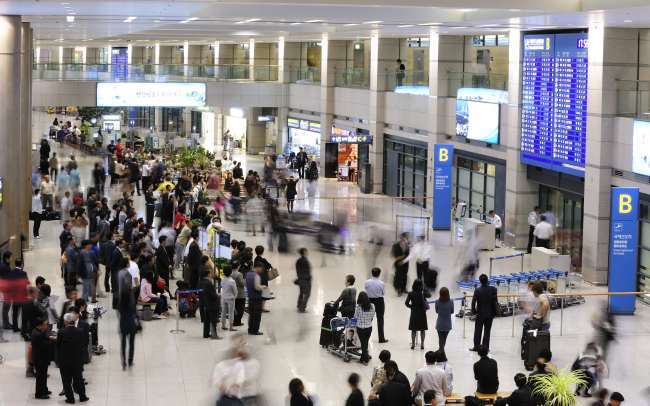Incheon Airport to streamline, expand cargo facilities
By Won Ho-jungPublished : Dec. 14, 2016 - 15:43
Incheon Airport will build a new cargo complex and terminals with an aim to raise its annual freight volume to 3 million tons by 2020, the Transport Ministry said Wednesday.
It is part of a move to improve the airport’s freight competitiveness in the face of changing air cargo market trends, with the world’s trade volume on an overall slowdown.
It is part of a move to improve the airport’s freight competitiveness in the face of changing air cargo market trends, with the world’s trade volume on an overall slowdown.

Traditional air cargo items such as electronic products are now turning to marine shipping to save costs, while demands from courier airliners are increasing due to a rise in global e-commerce.
South Korea’s largest airport has also been facing tougher competition from China and the Middle East.
The airport’s third-stage cargo complex is expected to be approximately 320,000 square meters in size and will cost 41.1 billion won ($35 million) to build. The complex will break ground in July 2018 to be open by mid-2019. Approximately 90,000 square meters of space will be developed first to open next June.
The complex will include facilities designed exclusively to handle perishable cargo such as food and pharmaceuticals by creating cold storage areas that can reduce processing time by up to 1 1/2 hours. The airport will also actively push to launch and expand flights to the countries of origin of fresh cargo.
Through such measures, the airport aims to create additional perishable cargo volume of over 60,000 tons a year.
The airport will also build a new terminal specifically for FedEx and expand the existing terminal for DHL in the hopes of absorbing demand flowing from China.
The ministry said it would seek to simplify the transportation process of Korean products being sold overseas via e-commerce by having airliners overtake the entire delivery process from door to door. Currently, forwarders or postal services are in charge of on-land transportation that often leads to higher cost and longer transportation time, the ministry said.
“For Incheon Airport to be competitive against China, which has high domestic demand, and the Middle East, which is convenient for shipping to Europe, it must differentiate itself through investments in infrastructure and process improvements,” the ministry said in a statement.
By Won Ho-jung(hjwon@heraldcorp.com)










![[Robert J. Fouser] Social attitudes toward language proficiency](http://res.heraldm.com/phpwas/restmb_idxmake.php?idx=644&simg=/content/image/2024/05/16/20240516050799_0.jpg&u=)
![[Graphic News] How much do Korean adults read?](http://res.heraldm.com/phpwas/restmb_idxmake.php?idx=644&simg=/content/image/2024/05/16/20240516050803_0.gif&u=)





![[Herald Interview] Byun Yo-han's 'unlikable' character is result of calculated acting](http://res.heraldm.com/phpwas/restmb_idxmake.php?idx=652&simg=/content/image/2024/05/16/20240516050855_0.jpg&u=)
